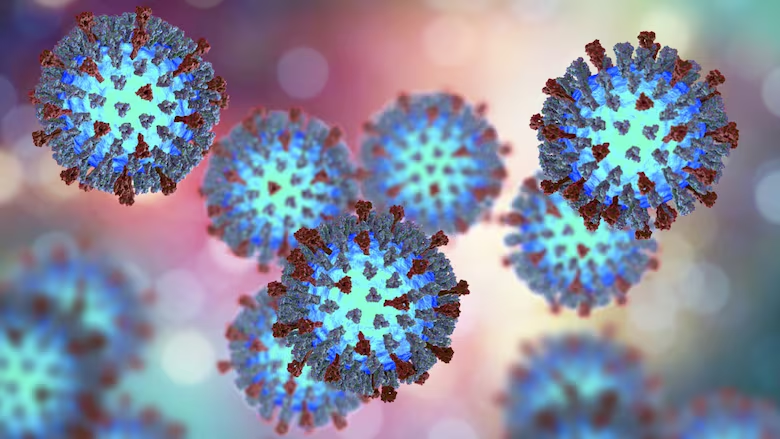N.B. Public Health issues exposure notice after confirmed measles case in Moncton
Potential exposures at Fredericton International Airport, Stella-Maris-de-Kent Hospital

A confirmed case of measles in Moncton has prompted New Brunswick Public Health to issue a list of times and places where people could have potentially been exposed to the contagious disease.
In a news release Friday night, the Department of Health said the case is likely the result of recent international travel.
The release does not say which country the patient travelled from. Department spokesperson Tanya O'Callaghan did not specify the person's age range but said they are an adult.
The list of possible exposure locations as of Saturday afternoon includes:
- Montreal's Pierre Elliott Trudeau International Airport on July 20 between 11:20 a.m. and 3:35 p.m.
- Air Canada Flight 1550 from Montreal to Fredericton on July 20.
- Fredericton International Airport arrivals on July 20 between 2:20 p.m. and 5 p.m.
- The emergency department at Stella-Maris-de-Kent Hospital in Sainte-Anne-de-Kent, N.B., between 5:30 p.m. on July 22 and 2:30 a.m. on July 23.
- Jean Coutu Pharmacy, 10525 Rue Principale, Saint-Louis-de-Kent on July 21 between 9 a.m. and 9:30 a.m.
Public Health officials will contact individuals who were at the hospital during the potential exposure times, said the release.

Dr. Rita Gad, regional medical officer of health, said there are no other suspected cases as of Saturday afternoon.
The patient did have close contacts, Gad said, but whether those contacts self-monitor or isolate depends on whether they have had measles previously or were vaccinated against it.
"If we know that they are immune, they do not need to isolate," she said. "But if we don't know, or we know that they are not immune, they will need to isolate from Day 5 until Day 21."
Any further cases or exposure sites will be tracked and reported by Public Health, Gad said.

She said those without full immunization against measles are most at risk, and emphasized that it is very easily spread through the air.
"If you exposed, for example, 10 people … who are not vaccinated or not immune to measles, nine of them will get the disease," she said.
"If you go into a room for, you know, a couple of hours after a case has left, you still can be exposed."
For anyone who was potentially exposed, Public Health is advising they check their immunization records or contact their health-care provider if they are unsure about their immunization status.
"If you or someone you know was in those locations at those times, it is important to self-monitor for symptoms of measles," Gad said in the release.
She noted Public Health has contacted those who were present at the listed locations and times to determine their vaccination status. The measles vaccine is 97 per cent effective, she told CBC News.
Do not go to ER if symptoms occur: Public Health
The first symptoms of measles usually present between eight and 12 days, she said, and can include fever, conjunctivitis and dry cough.
Three to four days later, there may be a rash that starts on the face and spreads elsewhere.
Gad says symptoms can progress to serious conditions such as pneumonia.
"If you experience any symptoms after being exposed, you should self-isolate," Gad said.
"Do not go to a clinic, physician's office or emergency room. You must contact Telecare 811 so that necessary measures can be put into place to prevent the spread to others."
The Department of Health said New Brunswick Public Health is working with the Public Health Agency of Canada and Quebec's public health authority given there were potential exposures outside New Brunswick.
In New Brunswick, the vaccine that protects against measles, mumps, rubella and varicella is free of charge for babies aged 12 and 18 months, the department said.
Additionally, individuals born in 1970 or later who have not previously received two doses of the vaccine can also contact their health-care provider to be immunized.
The measles virus is transmitted through the air or by direct contact with nasal or throat secretions of an infected person, the department said.
Gad urged people to get vaccinated against the virus, especially before travelling to affected areas.
With files from Savannah Awde